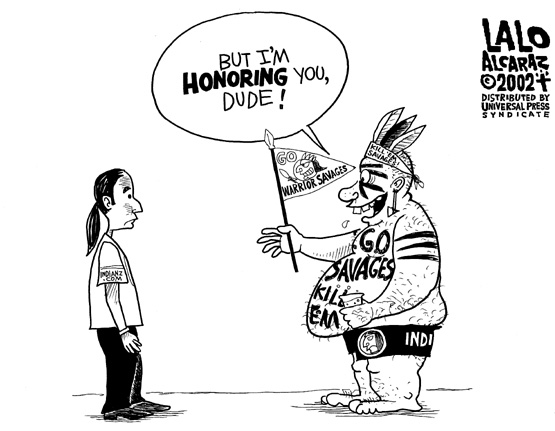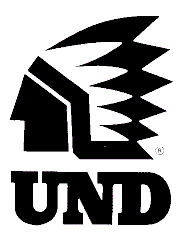The Fighting Sioux are back: My passionate plea against Indian mascots
No. They're not. Honoring someone does not consist of taking their culture, reducing it to a one-dimensional racist stereotype, and representing them however you see fit. It's about power and who has the right to represent whom. Also, this cartoon helps. I don't consider a dude in warpaint and feathers making a mockery of my culture honoring. At all. Also, not all Indians are "fierce" and "brave," just like not all white (or Black or Latino) people are "<insert stereotype here>".

That's because there is not an active system of colonialism and oppression marginalizing the Irish, "Vikings," or Catholics in our country. Native peoples are still living under colonial rule--take a look at stats from any area of society, and you'll see Native people at the bottom. I'm sorry if you feel "oppressed" as a catholic or a viking--but you still have a helluva lot of white privilege that kinda negates it. Sorry.
What's next, animal rights activists telling us we can't use ANIMALS as mascots?! Where does it end?!
Yeah, cause Native people (PEOPLE) are on the same level as animals? Thanks buddy. Thanks a lot.
What about the Wizards? Pirates? Cowboys?
Um, mythical beings or occupations are not the same as an entire race of people.
...and a horrible follow-up, Fryburg did another study that compared white students, and in all the areas where Native students' self esteem, community worth, and possible selves went down, white students went up. No active oppression in American society, right? White students directly benefit from racism against Native students.
In sum: Scientific research shows that mascots and Indian stereotypes, regardless of if they are "good" images (Pocahontas, The Fighting Sioux) or "bad" images (Chief Wahoo), they cause depressed self esteem, decreased community worth, and decreased possible selves--even when students say the images don't bother them. And images are worse than words.
So still want to tell me how the Fighting Sioux are no big deal and I should get over it?
The Native American Mascot: Tribute or Stereotype?
By Sam Sommers
Perhaps most problematically, in a final study a variety of Native American mascots were shown to different groups of college student respondents. Afterward, students were asked to write about what their life would be like in one year. Those Native American students exposed to mascots were significantly less likely to use achievement-related language in anticipating their future than were students in a control condition. That is, having seen and read about mascots, Native Americans became less likely to make achievement-related predictions for themselves regarding good grades, graduating, finding a job, etc.
The data from these studies are consistent with the idea that these mascots are often viewed positively, even by members of Native American communities. At the same time, they are also consistent with the conclusion that there are negative psychological consequences to such mascots, even if those who experience these consequences can't or won't articulate them when asked.
(And, of course, there are yet other questions to be asked about the effects of such mascots. For example, to what extent do they attenuate versus exaggerate racial stereotypes held by White people? In a separate investigation published in 2011, a different set of researchers concluded that Native American mascots activated negative, but not positive, stereotypes among Whites.)
In the end, these data pose a problem for claims that these mascots are honorific and likely to enhance the self-esteem of Native Americans. Even when that is (or has recently become) the motivation behind a team name, such good intent is not sufficient to bring about good outcomes. As the authors of the paper described above explain, "American Indian mascots do not have negative consequences because their content or meaning is inherently negative. Rather... [the mascots] remind American Indians of the limited ways in which others see them."
By Rhonda LeValdo


" Native peoples are still living under colonial rule--take a look at stats from any area of society, and you'll see Native people at the bottom"
ReplyDeleteThis is not the best of the arguments. Central to it is the idea that poverty means colonization.... well there are a hell of a lot of poor people of all colors who are not indigenous.
As a casual argument, it seems fine to me. All she's saying is 1) that Natives are generally worse off than people in other ethnic groups. And 2) that this is caused by government policies, not just by economic factors.
ReplyDeleteSome of those studies (depression) leave out It seems at first reading, the native American student "control group." There is enough other source anyway. My father hated polish jokes. Of course he was forced from a homeland where he was a native. About 3 million non-Jewish Poles were murdered. Good perspective all around yet assuming asses will always be around, also please look deep inside and find self strength of joys.
ReplyDelete